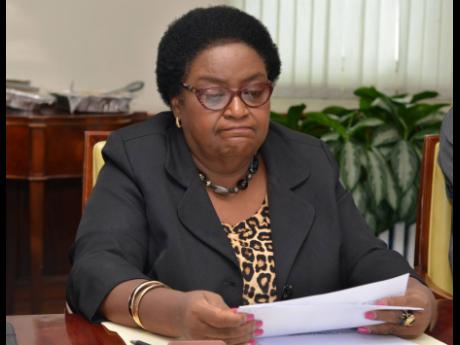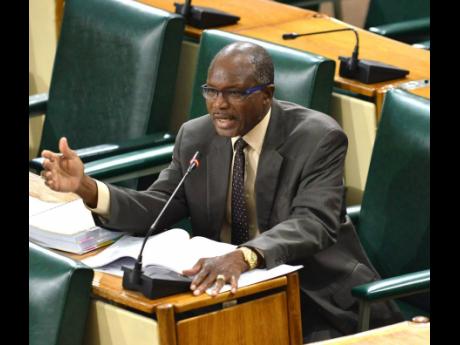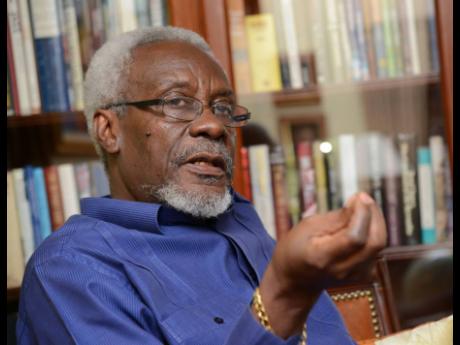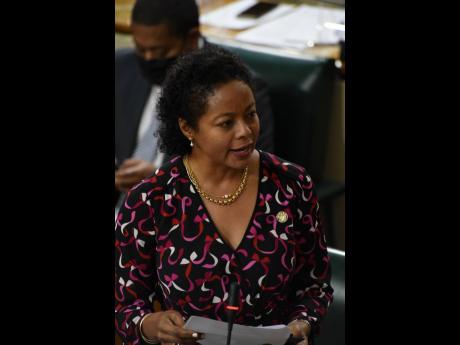Hanging in the balance
Public officials weigh the future of the Office of the Political Ombudsman
If some parliamentarians have their way, the Office of the Political Ombudsman would cease to exist in its current state as an independent commission of Parliament and be subsumed under the Electoral Commission of Jamaica (ECJ). On the other hand...
If some parliamentarians have their way, the Office of the Political Ombudsman would cease to exist in its current state as an independent commission of Parliament and be subsumed under the Electoral Commission of Jamaica (ECJ).
On the other hand, an equal number of current and former legislators believe the office is critical to the political process and is valuable in holding individuals to account, despite having only recommending powers.
The incumbent political ombudsman, Donna Parchment Brown, said the future of the office is ultimately in the hands of the country’s legislators, but pointed out that since the days of Justice James Kerr, it has proven valuable to the Jamaica’s political process.
Parchment Brown was named Jamaica’s fourth political ombudsman in 2015, succeeding Bishop Herro Blair, who resigned in 2013. Jamaica’s first ombudsman was Resident Magistrate Errington Green, who was appointed in 1977. The second ombudsman, Justice James Sewell Kerr OJ, QC, was appointed in 1988.
Long-time critic and parliamentarian Everald Warmington believes the office should be disbanded and the functions transferred to the ECJ, the body responsible for the country’s electoral operations.
Four of the eight ECJ commissioners are representatives of the two major political parties.
In an interview with The Sunday Gleaner, Warmington said the Office of the Political Ombudsman is on life support.
“Obsolete. Serves no purpose,” he declared.
“I brought a private members’ motion to Parliament asking for whatever duties it (Office of the Political Ombudsman) has to be subsumed by the Electoral Commission. It went to committee and went to Cabinet. The office doesn’t serve any purpose,” he insisted.
The Cabinet, however, rejected Warmington’s private members’ motion (2012) and appointed Parchment Brown at the end of Blair’s tenure. She was sworn in on November 16, 2015 for a seven-year term, with the possibility of a five-year extension.
When asked whether he believed that Parchment Brown could be the last political ombudsman, Warmington was cautious in his response.
“I don’t want to say anything where that is concerned, but if it was left up to me, that office would be closed a long time ago. What I can say, that office is on its way out,” he said.
Jamaica Labour Party (JLP) Dr Horace Chang agrees with Warmington.
“The function should be absorbed into the Electoral Commission,” Chang, who is also the deputy prime minister and minister of national security, told The Sunday Gleaner.
Of the same mind, too, is Justice Minister Delroy Chuck, who pointed out that his views on the matter were personal.
PERSONAL OPINION
“In my personal opinion, the budget could be better used. My assessment of the office is that it is totally unnecessary at this time and the functions could be more effectively carried out by the Electoral Commission that has proven to have strong moral suasion,” Chuck said.
He added, “At this stage, however, I have no idea of the way forward, and to the best of my knowledge, there is no official position on the future of the office. So far, however, the office has been extremely ineffective.”
In contrast, other officials believe that the Office of the Political Ombudsman remains necessary, but it needs additional powers to apply sanctions instead of giving mere recommendations.
Former Prime Minister P.J. Patterson, whose administration de-escalated political tribalism and re-established the office, believes it is unfair to attack its usefulness when Parliament has tied its hands.
Incidentally, it was while Patterson was prime minister that former JLP leader Edward Seaga lobbied for the office to be re-engaged following the retirement of Justice Kerr.
“During discussions at Vale Royal, the Opposition argued strongly for its restoration and revival. In the spirit of trying to reach a consensus on national issues and bridge the political divide, it was accepted by me and restored with clearly defined purposes,” Patterson told The Sunday Gleaner.
Patterson’s recommendation to appoint the Reverend Herro Blair was accepted. Blair served two terms.
“For the office to continue to exist, it must be able to execute its purpose, and, therefore, it must have some enforcement powers, which it does not presently have. So either you are going to give it the effective power and make it viable and meaningful, or you might as well dissolve it and seek to put those functions elsewhere,” Patterson said. “I think that as one looks at the reconfiguration of political institutions, it is in that context that its future needs to be examined.”
Minister of Legal and Constitutional Affairs Marlene Malahoo-Forte believes the political ombudsman’s role is needed.
“It is my considered view that the functions performed by the political ombudsman are important and remain relevant,” she told The Sunday Gleaner.
“At the same time, I am undecided whether the office ought to be a stand-alone entity or be incorporated by the Electoral Commission.”
Despite being on the receiving end of the political ombudsman’s wrath recently, People’s National Party (PNP) General Secretary Dr Dayton Campbell said the office should remain because it serves a purpose.
“It should not be dissolved. The political environment has the potential of becoming volatile and the adherence to a code of conduct is essential. If anything, the office needs to be further empowered to be more effective,” he said.
PNP President Mark Golding, who, last December, was asked by Parchment Brown to apologise to JLP Chairman Robert Montague for referring to the then Cabinet minister as a “likkle bwoy”. She also ordered him to pay $20,000 to a charity of Montague’s choice in his constituency.
Golding said he would not apologise as the comments made were part of general politicking.
In defence of the necessity for a political ombudsman, Parchment Brown said a country must have institutions.
TICKLISH ISSUES
“The commissions of Parliament are a set of institutions that are intended to deal with some ticklish issues that are important to the State. The political ombudsman is one,” Parchment Brown reasoned.
She said her office works closely with the police, who are often asked to investigate politically related allegations and even more serious breaches of the political code of conduct signed by the JLP and PNP.
Addressing the issue of cost to taxpayers, she said the political ombudsman’s salary has not increased since 2007. Blair only received one increase during his tenure. The small office staff, including an attorney, are also not receiving the gratuity they should, and they are not pensionable.
“We are wide awake every day trying to work with the political leaders, but at the end of the day, the prime minister and leader of the Opposition are the primary leaders of the legislation and the owners of this concept of keeping good relations between supporters of political parties,” Parchment Brown said.
She said every intervention of the political ombudsman will not be successful, but her office only intervenes when something happens.
“The political polarisation in Jamaica suggests that such an office should remain and, in fact, there is work to be done. I think we would be doing the ECJ a grave injustice if we were to ask them to intervene in quarrels that arise between different political factions. I don’t think that is ideal at all,” said the political ombudsman.
“The job of the office is not to shame or embarrass anyone, but to play a healing role and to right what is considered wrong. But I am convinced, not only for myself, that an entity like this has served Jamaica well, despite challenges.”




